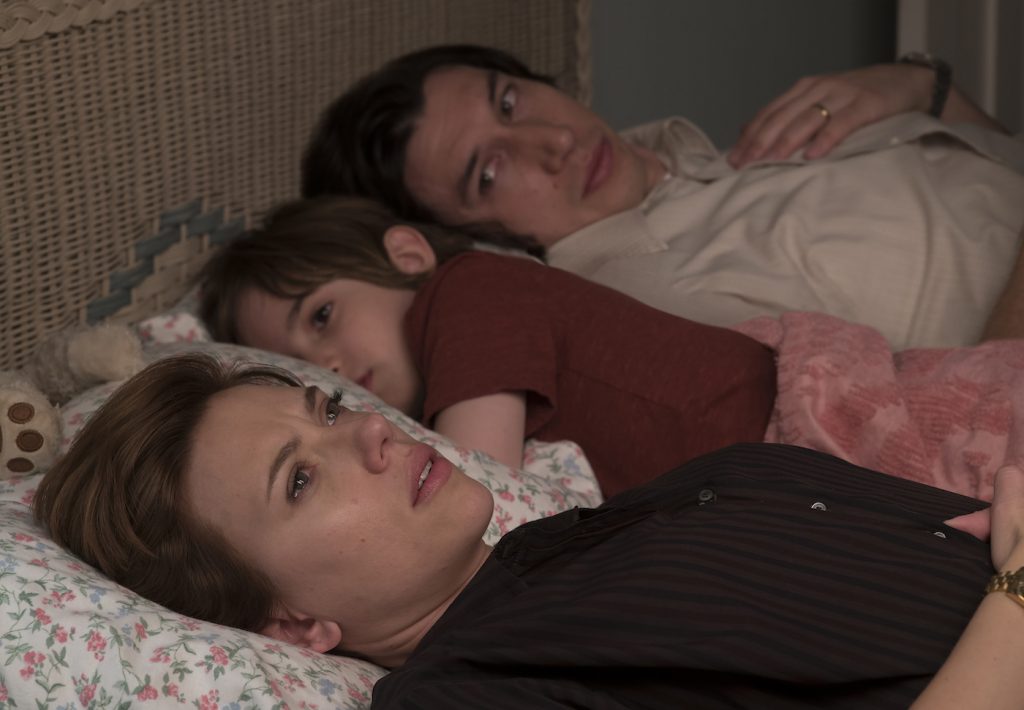TIFF 2019: Noah Baumbach’s Devastating Marriage Story
One of the buzziest films at this year’s TIFF was writer/director Noah Baumbach’s Marriage Story. Starring Scarlett Johansson and Adam Driver as Nicole and Charlie Barber, a couple who have already agreed to divorce by the time our story begins, Baumbach’s latest is a bittersweet gem. The lead performances from Johansson and Driver are as good as you’d both hope and expect. Baumbach’s script offers no villains, no easy outs, and no clean explanations on why, exactly, a marriage falls apart, and what, exactly, those caught in its implosion are supposed to do. For children of divorced parents or divorcees themselves, there is so much truth here. For everyone else, well, there is so much truth here.
Nicole’s an actress and Charlie’s a director. They have been partners in every sense of the word, including creating a theater company in New York. Nicole wants to branch out and move to Los Angeles. Charlie wants to stay in New York. They want their divorce to be as amicable as possible; no lawyers, no unnecessary drama. Leave that for their careers. This plan soon falls to pieces. Nicole decides she needs a little help and hires Nora Fanshaw (a predictably terrific Laura Dern) to advocate on her behalf. Making all of this more complicated is that Nicole and Charlie have a son, Henry (Azhy Robertson). Feeling threatened, Charlie hires his own representation (Alan Alda). The cracks that have long been present in their marriage slowly widen during the divorce. Soon, they’re chasms, and Nicole and Charlie, competitive by nature, begin to do whatever it takes to triumph over the other in these proceedings. Of course, there can be no triumph here.
As we did for our previous TIFF recaps of The Lighthouse, Parasite, and JoJo Rabbit, we’re going to tread lightly with plot details here. For those of you who know about Baumbach’s life, you’ll know he’s writing from memories of his own divorce. This goes some way of explaining why Marriage Story paints such a nuanced portrait of the end of a marriage. This is less a story about who’s to blame and much more a story about the complexities of marriage, the way little things can become big things when you’re not paying attention. It also explores how, once set into motion, a divorce can take on a life of its own. Many stories about relationships coming undone are focused on why things happened; Marriage Story is interested in that, but also in how you actually move forward. This question is made immensely more difficult by their love for their son and their desire to protect him, as they paradoxically spend money that was saved for his future to battle each other. Charlie’s greatest fear is Nicole will take Henry away and he’ll case being a real parent. The stakes are immense. The emotions are explosive. The amicable divorce they had hoped for now feels like a sick joke.
The performances are really astonishing across the board. Dern and Alda are excellent as Nicole and Charlie’s proxies in their battle. Yet you’ll walk away from this movie marveling at Johansson and Driver’s Nicole and Charlie. The emotional rigors of pulling this off must have been severe. There’s not a false note struck, not a moment where you feel like you’re not watching two people who used to be very much in love fighting very hard to hurt one another. It’s devastating. It’s honest. It’s also essential viewing.
Marriage Story will be in select theaters and stream on Netflix this fall.




